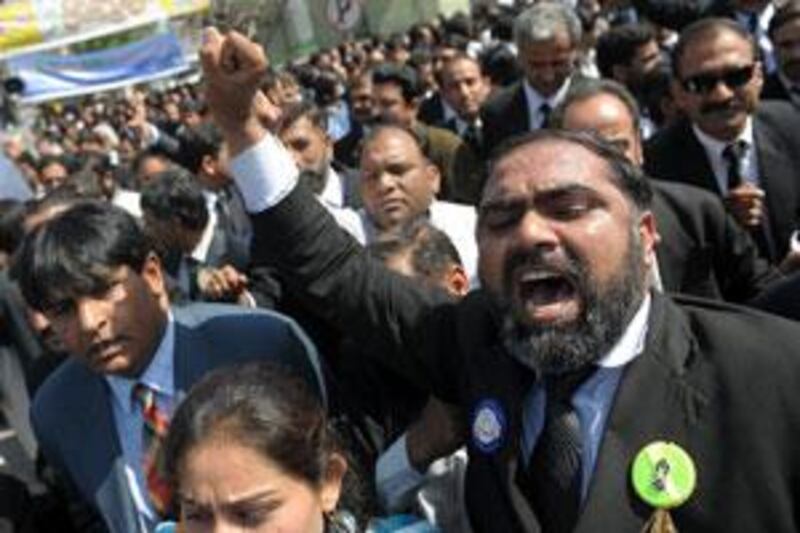ISLAMABAD, PAKISTAN // Pakistan's opposition leader predicted that the president, Asif Ali Zardari, would not last his full five-year term in office today as police turned away another convoy of protesters trying to reach the capital for a major anti-government demonstration. Authorities have detained several hundred political activists and lawyers in recent days, seeking to thwart a protest movement that is challenging the government's shaky one-year rule just as the West wants to see Pakistan unite and fight against al Qa'eda and Taliban extremists.
Activist lawyers are demanding that Mr Zardari fulfil a pledge to reinstate judges fired by the former president, Pervez Musharraf, a general who ousted opposition leader Nawaz Sharif as prime minister in a 1999 coup. The protest movement heated up last month when the Supreme Court banned Mr Sharif and his brother from elected office. After the ruling, the federal government dismissed the Punjab provincial administration led by Mr Sharif's brother, stoking anger in Pakistan's most populous region and putting the pair and their supporters on a collision course with Mr Zardari.
Mr Sharif - a seasoned political campaigner who is seen as closer to Pakistan's conservative Islamist forces than Mr Zardari - told a local TV station yesterday that he did not want to destabilise the government, but again appealed for Mr Zardari to reinstate the judges. By resisting that demand, Mr Zardari was "shortening his political life", he said, adding, "I don't think he will be able to complete his five years."
The lawyers' movement, Mr Sharif's party and other small political groupings called a "long march" to begin on Thursday across the country, with groups of protesters planning to converge on the parliament building in Islamabad on Monday and begin a sit-in. Early today, police stopped about 200 lawyers in a convoy of cars and buses from entering Sindh province en route to Islamabad. No arrests were made, but the protesters vowed to find another way to get to the capital.
Yesterday, several hundred protesters in Karachi, the country's largest city, set off for Islamabad in a convoy or cars, buses and motorbikes. They were stopped by police lorries blocking the motorway out of the city, and officers with clubs moved in to arrest the leaders, engaging in brief scuffles. While some protesters sped back into Karachi, several people sat on the road chanting, "Zardari is a traitor! Zardari is a dog!" before being arrested. After clearing the motorway, police dragged several protesters from a nearby restaurant and a mosque.
"Why is a democratic government crushing a peaceful protest?" asked Naeem Qureshi, secretary-general of Karachi Bar Association. "There is no difference between it and a martial law regime." Government officials said they would allow protesters only to gather in a park close to the capital, vowing to keep them from massing outside parliament or in other downtown areas. Officials have banned protests in much of the country.
The US has stepped up efforts to mediate a solution to the crisis, which threatens to undermine its goal of getting nuclear-armed Pakistan to do more in fighting militants along the border with Afghanistan. Richard Holbrooke, the Obama administration's envoy to Pakistan and Afghanistan, spoke to Mr Zardari and the prime minister, Yousuf Raza Gilani, while the US ambassador, Anne Patterson, met with Mr Sharif. But there were no signs of any breakthrough to calm political squabbling that is looking a lot like the unrest that preceded the removal of Mr Musharraf last year.
There were signs the crisis was causing cracks in the ruling party, which rose to power on a wave of sympathy votes following the assassination of Mr Zardari's wife, former prime minister Benazir Bhutto, by suspected militants before the 2008 elections. Most of the judges fired by Mr Musharraf have been restored to their posts, but the government has ignored a few, including a former Supreme Court chief justice. Mr Zardari is believed to fear that those judges could move to limit his power or reopen corruption cases against him. His supporters say the old chief justice has now becoming a political figure and will no longer be neutral.
* AP





